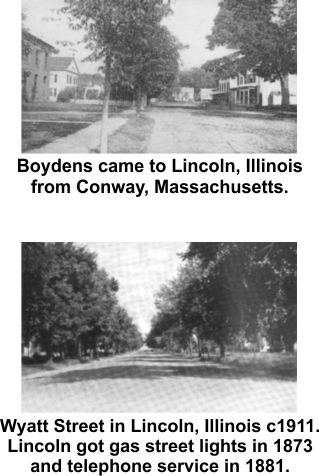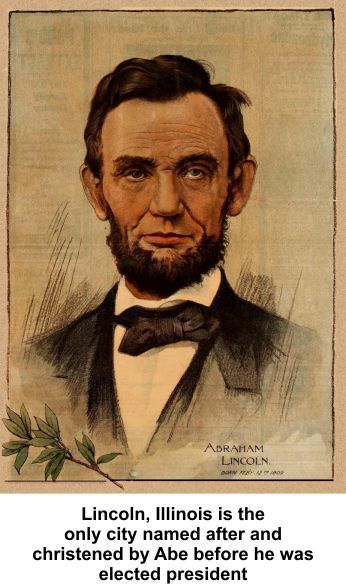|
John Trumbull Boyden (1846–1924) and his wife, Flora
Warner Boyden (1850–1920), residents of Lincoln, Illinois, a city of around
9,000, were in Chicago between Christmas and New Year in 1903. The 160-mile
distance was about a half days train ride. In their mid-fifties, their
children grown, the Boydens may have been taking time to enjoy the big city,
away from responsibilities for a change, letting George, their oldest, take
care of the family mortuary business. They may have visited relatives of
John's who lived in Chicago, children of John's late brothers, or John may
also have had business to conduct. Lincoln was the seat of Logan county, but
Chicago offered services and products not available in rural communities.
Among those John sometimes needed, as county coroner,† was chemical testing
for forensic purposes.
Boyden bio
After an early stint as a bank teller, John
Boyden took over the funeral home from his sister Kate's husband, Benjamin
R. Hamilton. Conway, Massachusetts, was hometown to both the Hamilton and
Boyden families. Benjamin and Kate returned to Conway in their senior years.
Lester and Cynthia Leonard Boyden had relocated their brood to Illinois
around 1857 when John was a boy. David Brainard Warner (1823–1889) and Eva
Schoolcraft Warner (1828–1878) came to Lincoln from New Albany, NY, soon
thereafter. John and Flora married in 1871. Nellie Boyden (1873–1960) was
born two years later, followed by George Boyden (1878–1942) and John Boyden
(1881–1948)

|

|
Low profile
The Boydens led such quiet lives that they might
have been taken by surprise at the hometown
attention brought by their escape from the Iroquois.
John had received newspaper mentions in the 1870s
when his fancy chickens were awarded breeding
prizes. He was a charter member of a Masonic lodge
in 1878, and Flora was a member of Eastern Star.
Other than non-controversial mentions in conjunction
with references to elections for coroner and brief
references to John's role in that capacity, the
Boydens did nothing to draw attention to
themselves.
The 1883 Zora
Burns homicide case
was the most publicized of the criminal cases with
which John was associated, and his involvement was
minimal. A wealthy Lincoln businessman was accused
and acquitted of murdering a young former housemaid
amidst accusations of a cover-up by his influential
business associates. The verdict was controversial
enough that it might have divided Lincoln citizens
along socio-economic lines for years. I just watched
the 6-part series based on John Grisham's nonfiction
book, Innocent
Man, about a pair of murders a century later and two
states away, in Ada, Oklahoma. In Ada, the accused
were poor and convicted rather than wealthy and
acquitted, but in terms of discord, the impact on
their small communities was probably similar.

|
|
In the years after the fire
George Boyden, John and
Flora's oldest child, took over operating the Boyden
funeral home for a time when his father retired
after forty years in the business, and later his son
in law, George Campbell, married to daughter Nellie,
took it on. In 1923 John sold the family homestead
at the corner of Logan and Pulaski in Lincoln to a
fellow who planned to turn it into a funeral home.
|
